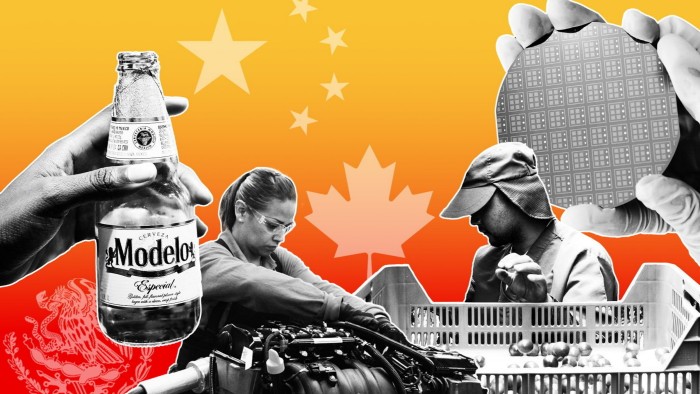Wall Street analysts are bombarding US companies with questions over how they will cope with Donald Trump’s trade wars, in an early sign of how the president’s policies are rippling through corporate America.
The word “tariff” has appeared at least once in more than 200 earnings calls executives held with analysts and investors, among groups listed on the S&P 1,500 Composite index of US companies that have reported earnings this year, according to FactSet data. The rise in queries about the trade levies echoes a similar jump during Trump’s first term in 2017-21.
Wall Street’s rising interest in how companies will contend with trade levies underscores how Trump’s trade skirmishes are affecting groups across a wide swath of industries.
The US president had planned to impose 25 per cent levies this week on Canada and Mexico, claiming they needed to do more to address migration and flows of fentanyl. He agreed late on Monday to pause the tariffs against Mexico and Canada for a month, while pressing ahead with a new 10 per cent tariff on imports from China.
“We do business with China. We do business with Mexico. We do business with Canada,” David Johnson, chief financial officer of fishing, camping and diving gear company Johnson Outdoors, told analysts on a call on Monday before Trump’s U-turn.
“We are working on mitigation strategies right now.”

Mexico is the largest single source of US imports, followed by China and Canada. Car and appliance manufacturing and agriculture are among the sectors highly dependent on cross-border North American trade.
Tyson Foods chief executive of Donnie King said the meatpacker was conducting “contingency planning” for any retaliatory tariffs on pork sold to Mexico. US pork producers shipped more than 1mn tonnes to Mexico last year, according to the US Meat Export Federation.
“So essentially, what we would do, whether it be pork or whether it would be chicken, is that we would find other markets, we would leverage our global knowledge and expertise to try to move those products if necessary,” King told analysts on Monday.
Alcoholic drinks are not as simple to redirect as a commodity like pork.
Constellation Brands, whose beers include the Mexican Modelo Especial and Corona, could face a 33 per cent hit to earnings from the tariffs, according to analysis by Bernstein Research, while the owner of Jose Cuervo tequila could suffer a 30 per cent profit decline.
Diageo, the London-based maker of Johnnie Walker, has calculated that if tariffs on Mexico and Canada start in March, the spirits giant’s operating profit will suffer a $200mn blow in the financial year to June 2025.
The company said it planned for all eventualities and could mitigate 40 per cent of the impact before resorting to price rises by managing inventory, such as shipping extra product to the US ahead of any new tariffs.
“It’s a very fluid situation,” said chief executive Debra Crew on Tuesday. “But we do have a lot of levers that we can pull, and we are continuing to engage with the US administration” as well as Canadian and Mexican authorities.
In a further sign of the effects on consumer-focused brands, toymaker Mattel said on Tuesday that new tariffs may prompt it to raise US prices as it has factories in countries including China and Mexico.

The effects could also be broad in the industrial sector.
Some car parts can cross borders multiple times during automotive production, “even something as simple as a fuse,” said Baird analyst Luke Junk. Suppliers would have little choice but to pass the cost of tariffs on to carmakers such as General Motors and Ford. They would in turn pass costs to consumers, he said.
Even after heavy domestic investment in the past few years, the US renewable energy industry relies on China. More than 70 per cent of the world’s inputs for solar panels like polysilicon, wafers and ingots are produced in China, as are more than 60 per cent of battery components like cathodes, anodes, and electrolytes.
Clean energy executives warned that tariffs would raise equipment costs and undercut the Inflation Reduction Act, which included $370bn in federal incentives for an energy transition. Trump opposes the legislation, which former president Joe Biden signed in 2022.
“We won’t die because of it, but we’d rather spend it on job creation,” said Martin Pochtaruk, chief executive of Heliene, which operates a solar panel factory in Minnesota and imports equipment from China.
As the tariffs on Mexico and Canada were paused late on Monday, investors showed signs of relief. Shares jumped for robotic surgery equipment manufacturer Intuitive Surgical, which last month warned of a hit from tariffs as “a significant portion of our instruments are currently manufactured in Mexico”.
By contrast, New York-based lock and alarm system manufacturer Napco Security Technologies touted an assembly base in the Dominican Republic.
Rivals “make everything in China”, chief executive Richard Soloway told analysts this week. “So I would expect that 10 per cent [tariff] is going to make us more competitive in the marketplace and help us win more market share because we have superior products and with superior pricing, the dealers are price sensitive.”
Reporting by Gregory Meyer, Taylor Nicole Rogers, Amanda Chu and Oliver Barnes in New York, Claire Bushey in Chicago and Madeleine Speed and Susannah Savage in London


